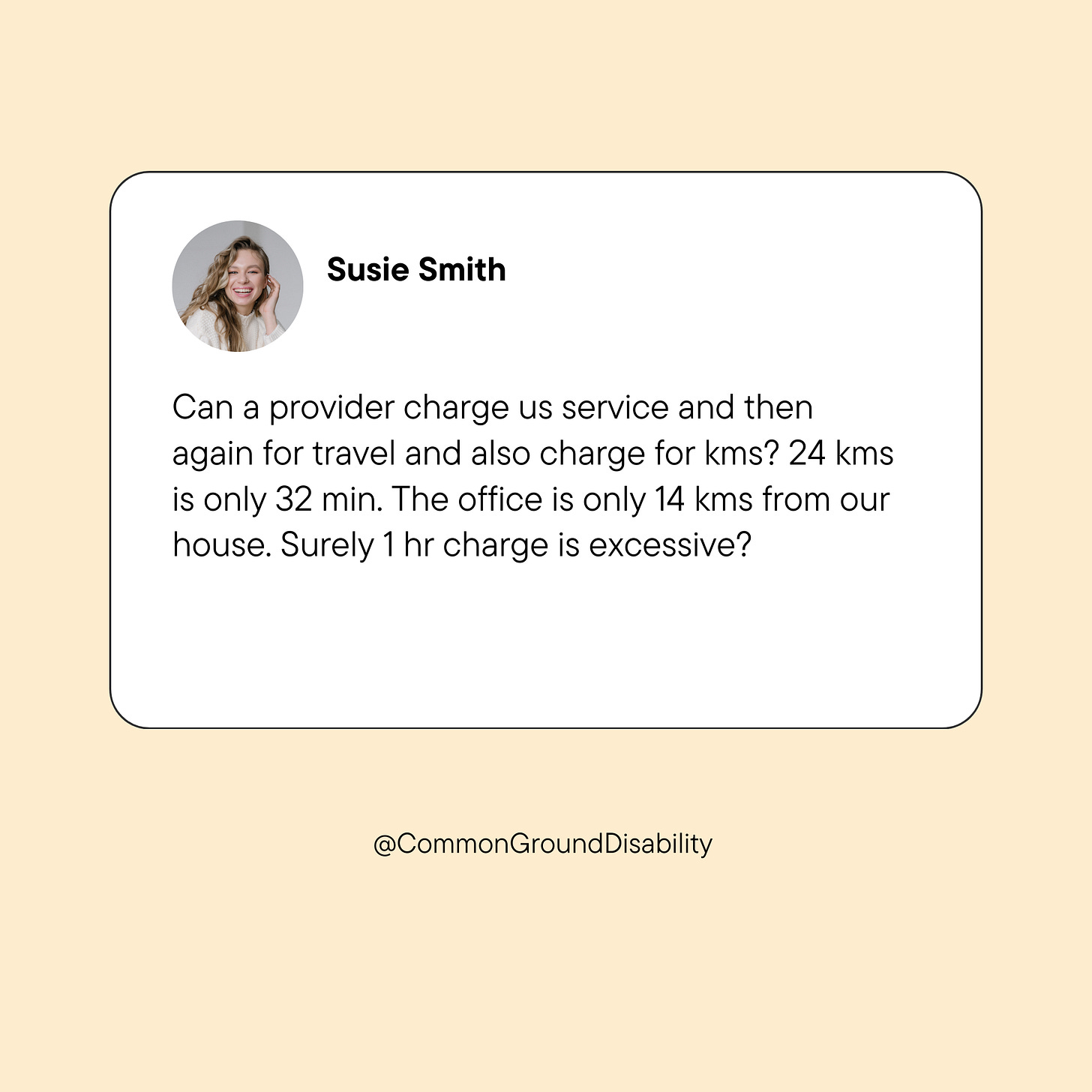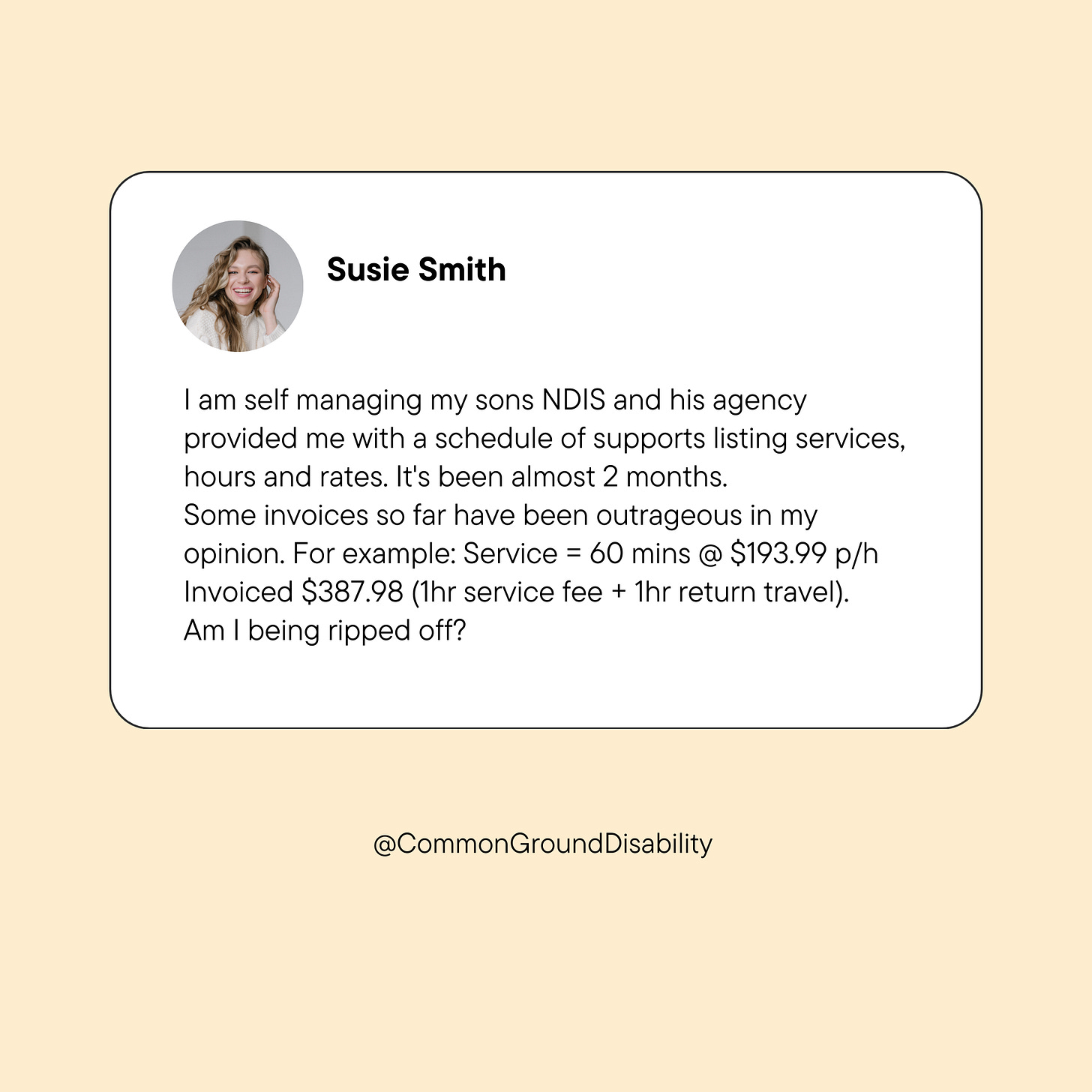Its 8pm and a rare opportunity has arisen to visit Granny tomorrow.
That means we don’t need the support worker that we had scheduled for the afternoon. I’d rather pay her a 2 hour cancellation fee, than pay her for the full 6 hour shift.
I text her to say ‘hey we’ve made other plans for tomorrow to visit Granny, so its a short notice cancellation and you can invoice us for 2 hours work’
She texts back ‘oh thats great the kids will see Granny. It’s okay, I feel bad charging the cancellation fee… so don’t worry about it. See you next week’
You might think ‘oh how sweet… this is clearly a worker who is in the industry for the right reasons’
And I might think - ‘awesome we saved a little bit of money there and isn’t she sweet'!’
Except I wouldn’t.
I would text back and say ‘hey I appreciate your kind offer but it’s important we stick to the arrangements in our Service Agreement so please invoice for the cancellation fee.’
Why?
So glad you asked! Let me tell thee all the ways…
Resentment.
We are a nation of people pleasers. Even in business and commercial arrangements we frequently cross our own boundaries or bend the rules to be ‘nice’. And what does this lead to? Resentment. I don’t want our support workers to be saying ‘oh its okay I wont charge the fee’ while they’re thinking ‘dammit I was relying on that money to pay the car loan’. Or even to pay for a $300 pair of shoes. After all how they use their money is none of my business.
I don’t want them to feel guilty about charging a cancellation fee - I want them to know their own value. Resentment is a sign that someone feels they are not getting adequately compensated for the time or energy they are putting in. (Even when and especially when they are not assertive enough to ask for what they actually want and need). It will rot away and damage the professional relationship and that does not lead to happy workers.
Relationships.
Like it or not, the boundaries between workers and friends can become blurry when we have support workers in our homes for over the years. Without that clear boundary sometimes the roles can get wonky. We might chat about personal topics at times. We may start to care about each other beyond the professional relationship. We might stray into the territory of doing ‘favours’ for each other rather than maintaining a transactional relationship of ‘you work for us and we pay you for your time’. When we start to see ‘favours’ occurring such as working an extra hour without charge, or saying ‘oh I won’t charge the public holiday rate today even though it’s what we originally agreed upon’ two things occur;
We cast ourselves in the light of a victim needing someone to ‘save’ us (ick!)
We start to feel in the debt of that person because they are going beyond what they originally agreed to, or worse yet we feel obligated to do favours for them to compensate.
This makes things more and more awks because one day the give and take won’t feel balanced any more. No one is keeping score. No one can figure out what is paid work and what is favours and friendship. Its a slow boat towards Resentment Land for one party or both (see above). Don’t recommend.
Respect.
I care about the incredible support workers on our team. I want continuity of care for my son. I want them to know that I respect their time and that their role and work is valued. I want them to be protected, healthy and well and financially stable. If they are entitled to sick leave, cancellation fees, use of our Companion Card.. whatever it might be that supports them to be able to support us, then I want them to have access to it.
Responsibility.
Our ability to manage the NDIS plan budget is ours. If I have overspent its my fault, not our support workers fault. So if I am looking to save a bit of coin and don’t want to pay a cancellation fee, it is probably due to my own budgeting mistakes and that shouldn’t impact our support workers.
Rules
Without clear rules, we’re just figuring it out as we go along. If we don’t start out with a slightly awkward conversation at the start to some written boundaries around what feels right for both parties, then be prepared for a far more awkward conversation later on when you feel that you’ve been overcharged, or the support worker thinks you’re ripping them off and emotions get involved.
A huge number of stressed questions in NDIS Facebook groups can be answered by one line…. “What does your service agreement say” and frequently the response is… ‘Oh we don’t have a service agreement…’
Well good luck with that, I often think... Because you’ve essentially hired someone to work for you but haven’t agreed upon whether;
they can invoice you for their travel to your home (and the limits),
what their position description actually entails
if they can charge you for writing up case notes, sending emails or talking to you on the telephone,
how much you are going to pay for a cancellation fee,
will they charge you for a ‘meet and greet’?
how many days you have to pay their invoices,
will they take a 30 minute break during their shift or just grab a snack during a quiet part of the day?
the legal and compliance requirements, code of conduct and role considerations along with screening such as Police Check
whether you should be charged GST on services,
who you should speak to if there are problems or you want to cease services
if you will be charged a higher rate for services after 8pm
will they charge you 1 hour to write a report… or 6 hours?
and so much more.
In other words be prepared for a shock when the first invoice arrives.
In Summation;
(as the Chairman Tay Tay would say),
There are soooo many benefits to having a formalised arrangement in writing that all parties can refer to in times of confusion. It doesn’t need to be an iron clad covenant filled with legal jargon that would make a barrister sweat. Keep it simple. There are even Easy Read versions of Service Agreements on the NDIS website. Let it take away the grey areas and leave you with a simple black and white breakdown of how things will work.
Think of it as your referee who will keep everyone in line and nothing needs to get personal. Profesh. Easy!
Question:
Do I have to have a service agreement? My service provider is saying that I have to sign one before they will work with me.
Most of the time no. Service Agreements are best practice (as long as you are comfortable with all the terms and don’t forget you can negotiate) but the only time the NDIA requires you to have a Service Agreement is for Specialist Disability Accommodation.
If the service provider insists on having a service agreement, then you can certainly request that the negotiate on any terms you don’t feel comfortable with. If you don’t agree with part of the agreement and they won’t negotiate then perhaps they’re not the organisation for you! Or at least be aware of what they will charge you, what you have agreed to and be smart about how you work with them so get the best value from your plan. Some examples include:
looking at ways to reduce provider travel costs (you go to them or chose providers who live very close by).
If you have to cancel and will be charged for the time, ask the practitioner to do some other non face-to-face work for you such as liaising with other therapists, assessments, working on reports, discussions with school or daycare, creating resources like social stories or updating AAC devices. If you cancel a support worker shift because you’re unwell perhaps they could do remote work such as food shopping, or creating resources like PECS or visual schedules.
Stay on the waitlist for other providers who have more favourable terms in their service agreement.
Understand the difference between a cancellation period and ceasing services notice. Often a provider will ask for 30 days notice to cease services, however they can only charge you for supports that fall within the cancellation period.
A final note on responsibility for Service Agreements. Sometimes families I am working with want a Service Agreement in place, but are working with an independent service provider who doesn’t currently have one. It’s really important that participants understand they are not responsible for helping an independent service provider to set up their own business.
I have referred participants to therapists and support workers, and then those therapists or support workers ask me if I can help them set up or write their Service Agreement. Um sure…. If you’re prepared to hire me as a consultant to help you set up your business. But lets be really clear - if someone wants to be a sole trader or independent contractor, then they are responsible for the set up of that business including designing all documentation for their policies and procedures, contracts and all other admin.
It is not the responsibility of the participant (or their Support Coordinator) to help a business run their business and it is not a good value use of Support Coordination (or NDIS) funding to write a Service Agreement for a service provider. Just no. Take responsibility for being a business owner.
#rantover.
Till next time,
x Anna








Oh my yes!! I hated service agreements because they seemed so stupid. So I was super resistant to them. Overall, they end for me because 99% of the time the worker/agency has broken the agreement outright (and often the law with it). But what I’ve learnt is, that for my OWN sanity, containment and later on, any excess guilt about taking a stand is helped immensely by service agreements. I’m still not good at them but not because I don’t like them anymore just because things have become out of control for me and I haven’t been able to write them out (they’re on the list). I would add (now), also when a service presents you with one, you actually don’t automatically have to accept their terms! You can negotiate and amend it as needed. For me this is imperative around expectations for communications with health professionals (usually I communicate and they don’t thinking it’s entirely acceptable to not do something they said they would for months on end and not advise me)….. so, amend and put it in. They may not like it, but it’s valuable.